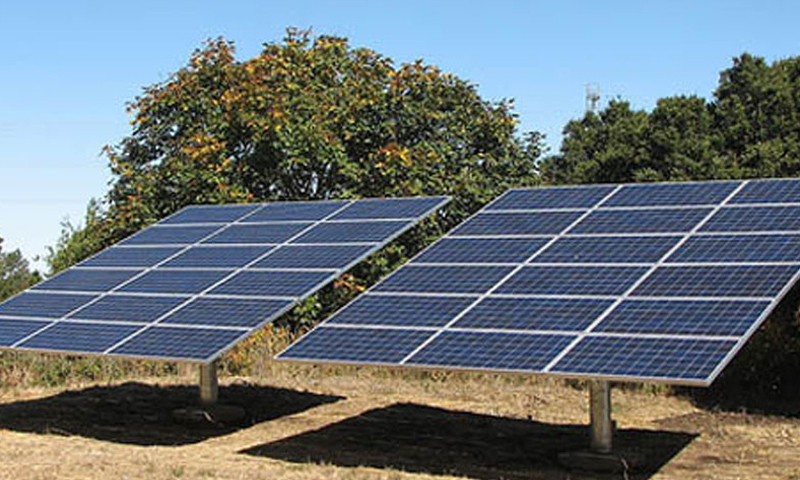ISLAMABAD: The government of Prime Minister Nawaz Sharif on Tuesday exempted customs duty and general sales tax on import of solar panels for promoting alternative and renewable energy in Pakistan.
Currently, the customs duty is applicable at five per cent and general sales tax (GST) at 17 per cent on imports of inputs as well as finished solar panels.
As per the decision, local manufacturers will now import duty free inputs for local assembling of solar panels, while importers will also enjoy duty exemption on import of finished solar panels.
A senior official in the ministry of industry said that the decision was taken to bring manufacturers at par with importers of solar panels.
“This decision will promote healthy competition in the domestic market,” said the official who requested anonymity.
Also read: Issue of solar panels import resolved
In the budget 2014-15, the government had imposed 5 per cent customs duty and 17pc GST on solar panels, which caused a hefty increase in the price of solar system in the domestic market.
Chairman Pakistan Solar Association Faiz Bhutta said that the waiver of taxes will lead to a reduction of Rs3,000 per 100 Watt panel. He said the price of 100 Watt panel had surged to Rs11,000 after July 1, 2014 owing to imposition of new taxes.
Explaining further the tax impact on the price of solar system, Bhutta said that 50 per cent cost in a solar system was of a solar panel. So the waiver of taxes, which he described at an average of 30 per cent, will reduce the retail price of the complete system.
“The price will come down because of this tax waiver,” the chairman hoped.
Moreover, the remaining 50 per cent cost is of the solar battery which includes 20pc customs duty, and 17pc GST, Bhutta said, adding that his association also demanded abolishing of whole duty on solar battery as well.
The waiver of duty and taxes on solar battery has yet to take place, the official added.
In the year 2013-14, solar panel of 350 MW to 400 MW was imported. For the current fiscal year, the projection was at 900 MW, Bhutta said, adding that lower price coupled with energy shortage will accelerate the import of solar panels.
In the last three months, the local manufacturers and importers were at loggerheads over the tariff protection being provided to the few existing local manufacturers.
According to the official, local manufacturers were yet to develop skills to produce international standard solar panels for the domestic market. To improve the standards of the local panels, government has given a deadline of June 30, 2015 to get international quality certifications.
To resolve the issue, Prime Minister Sharif had assigned Finance Minister Ishaq Dar the special task to look into the matter and settle all issues concerning import of solar panels.
Pakistan Solar Association Chief Bhutta said that major import destination of solar panels was China. However, some importers are also sourcing it from Germany among other countries.
He demanded a waiver on import of solar batteries as well.
In the budget 2014-15, Federal Board of Revenue had withdrawn exemption on items/parts manufactured locally. This had sparked a controversy among importers, who approached the federal government to remove the discrimination among manufacturers and importers of solar panel.
The decision is part of a policy that power generation through renewable energy resources be encouraged to overcome the energy crisis in the country.
SRO 575(1) 2006 had allowed duty free import of solar equipment (solar panels, solar batteries, solar charge controllers and solar inverters) from 2006 to June 30, 2014.
But in the 2014-15 budget, the rescinding of SRO 575 and its transposition to fifth and sixth schedule of Finance Act 2014 had resulted 32pc duties and taxes on solar panels, 50pc duties and taxes on solar batteries and 35pc on inverters, inflicting adverse impact on the solar industry.
Under Finance Act 2014, solar panels and batteries were included in CGO (Local manufactured List) without any study about the quantitative and qualitative production capability of local assemblers.
Hence the decision of imposition of duties and taxes on import of solar panels and batteries had slowed down the growth of solar market as solar companies not only paid duties and taxes but paid heavy demurrages and detentions charges in view of wondering from department to department for remedy.
There is yearly import of more than 500MW solar panels per year and local production capacity is only 10 MW per year.













































